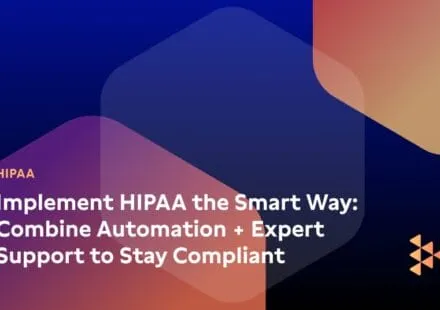Carbide helps digital health and healthcare vendors meet HIPAA requirements with pre-built policies and controls, as well as compliance guidance; no consultants or spreadsheets are required.
Ready to get HIPAA compliant without the guesswork?
Talk to a Carbide expert and see how our hybrid platform automates HIPAA while keeping you audit-ready.
Why HIPAA Compliance Matters
HIPAA compliance is foundational for protecting patient trust, maintaining business credibility, and enabling partnerships in the healthcare industry. If your organization handles Protected Health Information (PHI) as a covered entity or business associate, you’re legally required to comply with HIPAA’s Privacy, Security, and Breach Notification Rules. But the stakes go beyond legal boundaries. Failing to comply with HIPAA can have substantial financial, legal, and reputational consequences.
According to the HIPAA Journal, common violations include:
- Failing to perform a risk analysis
- Delayed breach notifications
- Unauthorized disclosures of PHI
- Use of unsecured communication platforms (e.g., unencrypted email or mobile apps)
- Inadequate employee training or oversight
What Happens If You Break HIPAA Rules?
Enforcement of HIPAA is handled by the Office for Civil Rights (OCR) at the U.S. Department of Health and Human Services. The severity of the penalty depends on the nature of the violation and whether it was due to willful neglect or an honest mistake.
HIPAA penalties are divided into four tiers:
| Tier | Description | Fine Range |
| Tier 1 | Lack of knowledge | $100–$50,000 per violation |
| Tier 2 | Reasonable cause | $1,000–$50,000 per violation |
| Tier 3 | Willful neglect (corrected) | $10,000–$50,000 per violation |
| Tier 4 | Willful neglect (not corrected) | $50,000 per violation |
The maximum annual penalty per violation type is $1.5 million.
Organizations may also face:
- Mandatory corrective action plans (CAPs)
- Increased audits and regulatory scrutiny
- Civil lawsuits from patients or state attorneys general
- Long-term reputational damage that impacts growth and partnerships
Even small businesses and startups have been penalized. One solo practitioner was fined $100,000 for ignoring patient access requests. Another healthcare provider paid $3 million due to repeated failures to implement security safeguards.
If you’re curious about the penalties for HIPAA violations, this article provides further detail.
Carbide’s Approach to HIPAA Compliance
Unlike point solutions or consultants that deliver static reports, Carbide builds compliance into your operations with a programmatic approach. You get the structure, automation, and expert insight needed to move beyond checklists and toward a scalable, defensible security posture.
Here’s how Carbide helps you meet HIPAA’s key requirements:
1. Automated HIPAA Risk Assessment
HIPAA requires covered entities and business associates to conduct a comprehensive risk assessment under the Security Rule. This includes identifying where PHI is stored, how it’s accessed, and what vulnerabilities exist.
With Carbide, you can:
- Automate the risk assessment process.
- Identify gaps across administrative, technical, and physical safeguards.
- Generate documented evidence ready for audit review.
- Assign remediation tasks to internal teams or vendors.
2. Pre-Built Policies and Procedures
HIPAA requires formal, documented privacy and security policies that guide your team’s handling of PHI. These must be tailored to your operations and reviewed regularly.
Carbide provides:
- A library of editable, HIPAA-aligned policy templates.
- Role-based access for drafting, approving, and publishing policies.
- Version tracking and activity logs for compliance evidence.
This saves weeks of manual writing and ensures you’re aligned with current legal requirements.
3. BAA Tracking and Vendor Oversight
You’re responsible for your systems and vendors. HIPAA requires Business Associate Agreements (BAAs) with any third party that accesses PHI on your behalf.
Carbide helps you:
- Track all vendors and classify them by risk level.
- Upload, review, and renew BAAs in one central location.
- Automate reminders for missing or expiring agreements.
- Log vendor compliance evidence for audits.
4. Technical Controls and Continuous Monitoring
HIPAA’s Security Rule also requires technical safeguards, including:
- Encryption of PHI.
- Access controls and multi-factor authentication.
- Audit logs and intrusion detection.
- Device and media control policies.
Carbide integrates with tools like Google Workspace, AWS, Azure, Okta, and Slack to automatically validate that your systems meet security control requirements. Any gaps are flagged in real time, making it easy to stay audit-ready.
5. HIPAA Training and Team Accountability
Training is not optional. HIPAA requires all workforce members with access to PHI to be trained on privacy and security practices annually—or more often, if policies or systems change.
With Carbide, you can:
- Assign HIPAA training to users across your organization
- Track completions and generate reports
- Include policy acknowledgments and onboarding workflows
- Integrate training into your compliance dashboard
6. Audit Readiness and Reporting
Whether you’re working with enterprise healthcare partners or preparing for an OCR audit, you need documentation to prove your program is working.
Carbide helps you:
- Map your compliance controls to HIPAA’s core rules.
- Export audit-ready reports and control summaries.
- Demonstrate continuous monitoring, not just one-time checks.
- Respond to security reviews with confidence.
Ready to Build a Scalable HIPAA Program?
HIPAA compliance doesn’t have to be complex or resource-draining. With Carbide, you get a purpose-built platform and team of experts ready to provide hands-on support to help you streamline your compliance efforts, reduce manual work, and strengthen security over time.

